Netflix’s Exploding Kittens series and what it reveals of streaming giant’s gaming ambitions
There’s a weird new cartoon on Netflix but it’s not just a show, it’s an insight into the company’s grand gaming ambitions.
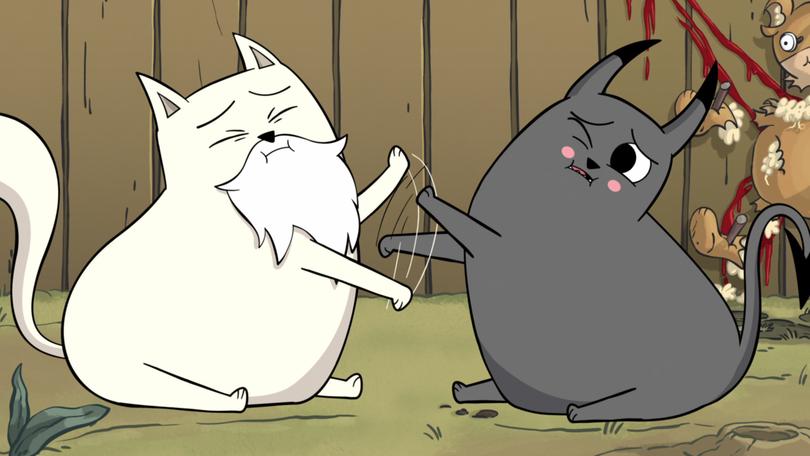
If you had no context, Netflix’s new release series Exploding Kittens sounds like one of those strange adult cartoons that seem to thrive on the edges of mainstream entertainment.
The general gist is that God’s compatriots in heaven sends him down to Earth to humble him and have him connect with humans.
But rather than be the all-powerful omniscient being, God has been funnelled into the body of a housecat. And just for funsies, so has his rival, Beelzebub. So, now Godcat and Devilcat are wreaking havoc on the mortal plane, as tubby felines with superiority complexes.
Sign up to The Nightly's newsletters.
Get the first look at the digital newspaper, curated daily stories and breaking headlines delivered to your inbox.
By continuing you agree to our Terms and Privacy Policy.It’s a bizarre series with plenty of offbeat humour that will appeal to fans of the likes of Rick and Morty, Paradise PD, Bob’s Burgers, Koala Man and King of the Hill. Not coincidentally, among its executive producers are King of the Hill’s Mike Judge and Greg Daniels.
That’s the show. But that’s not what Exploding Kittens is really about.
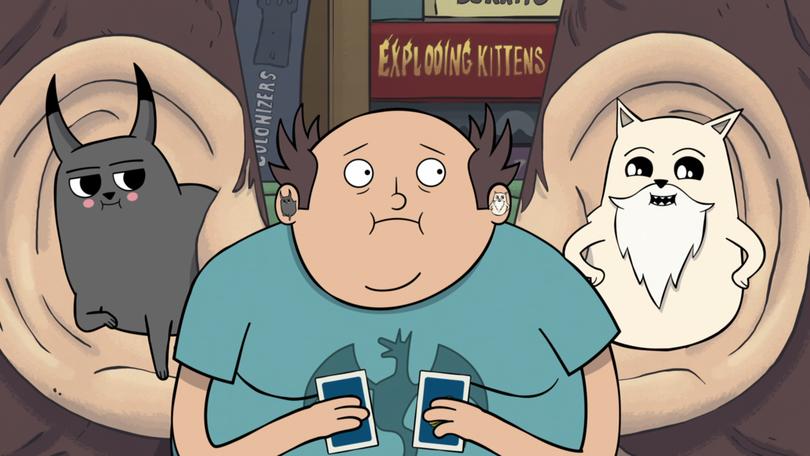
Exploding Kittens speaks to Netflix’s ambitions in the gaming space. There are various estimates of how much the global video games industry is worth but all those numbers put it at upwards of $US220 billion while PwC projected it would hit $US321 billion by 2026.
For perspective, the movie industry is worth less than half of that.
If you haven’t been paying attention, it’s been a long time since video games were the realm of nerdy boys playing Doom on hardwired computer networks on a Friday night. The industry bleeds into all demographics and spaces, supercharged by mobile gaming.
Netflix wants a piece of that very lucrative pie. The company subtly flagged its curiosity when in 2018 it launched Bandersnatch, an interactive episode of Black Mirror that was essentially a choose-your-own-adventure experience.
The viewer, using the buttons on their remote control or mobile phone, was able to pick what the character could do next, leading, eventually, to one of five different endings.
It was an interesting experiment that, at the time, Netflix wasn’t calling a video game. Bandersnatch also didn’t trigger a deluge of similar choose-your-own-adventure interactives, except for an Unbreakable Kimmy Schmidt movie in 2020.
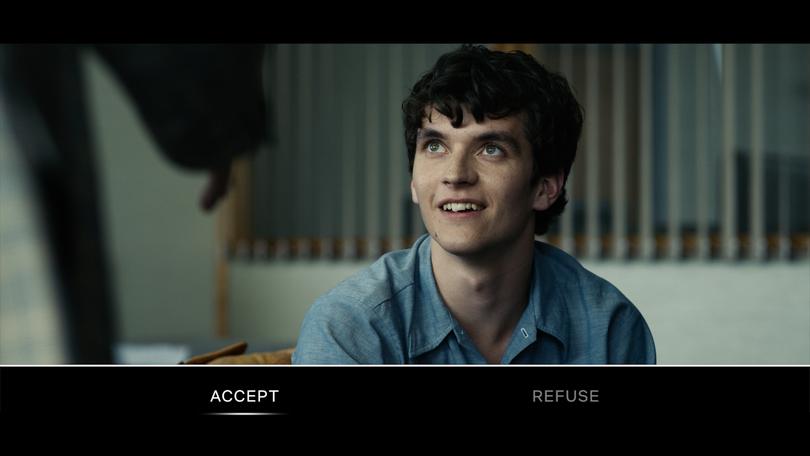
By then, Netflix had likely decided it was going to get into games proper because by November 2021, it made its intentions public. It has since bought four game companies including the maker of Oxenfree, Night School Studio, and established two in-house.
When it launched its gaming offering, it was with five titles: Stranger Things: 1984, Stranger Things 3: The Game, Shooting Hoops, Card Blast and Teeter Up. And they were all included with your membership — best of all, there were no ads or in-app purchases.
The two Stranger Things games are instructive because while the gaming side of the business is a no-brainer when it comes to another revenue stream that could, perhaps eventually, overtake movies and TV shows, it’s also about intellectual property.
Why limit the franchise potential of a popular title you own with just the series when you can build it out like legacy entertainment companies have for decades?
Stranger Things isn’t just a TV series. It’s also games, a stage show (The First Shadow, a prequel story, is about to open in London at the Phoenix Theatre), loads of merchandise and an in-person, experiential space in the newly opened Netflix Houses, a sort-of mini theme park the company has opened in two American shopping centre.
Full-scale theme parks and cruise ships are not out of this world.
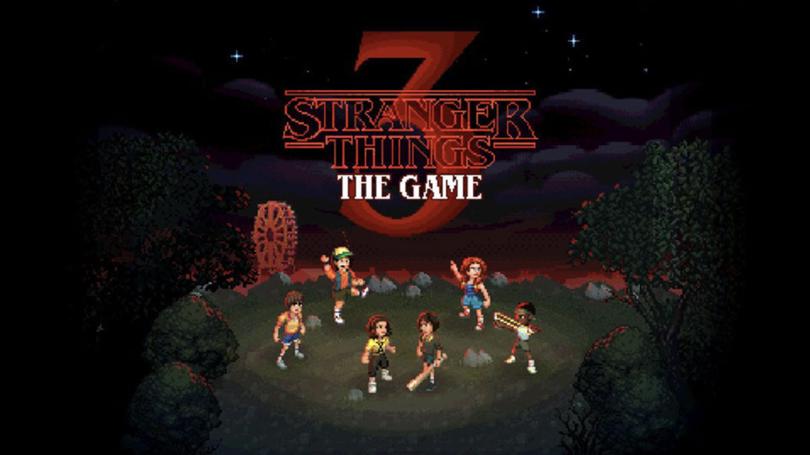
Which brings us back to Exploding Kittens, which began life as a physical card game that launched in 2015 after it raised $US8.7 million on Kickstarter. Expansion packs followed, and so did a mobile game on iOS and Android.
Eventually, Netflix came calling. But when the streaming giant teamed up with Exploding Kittens, it wasn’t only interested in the video game. It also wanted to capitalise on the partnership and the IP and make an animated TV series. At the time, the company’s head of external games said it wanted to give subscribers entertainment in “whatever format they enjoy”.
There are other crossovers, including ones based on its series Love is Blind and Too Hot to Handle. There are classics like Minesweeper which premiered this month, or simulations such as Farmville rip-off Country Friends. There’s even a version of Grand Theft Auto.
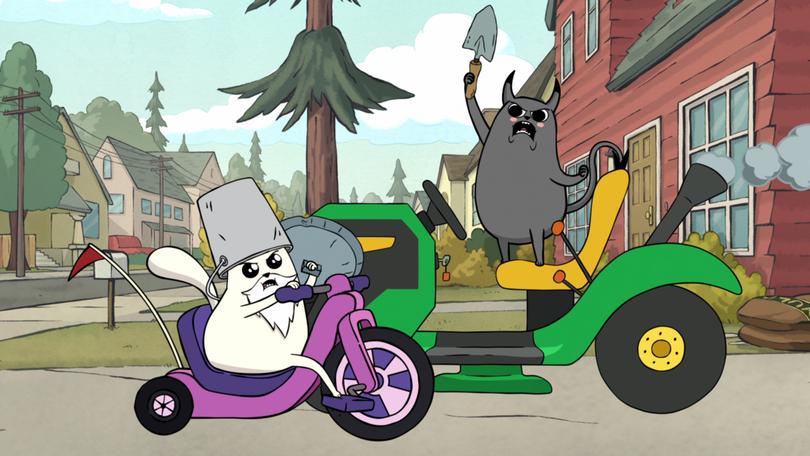
Hollywood has frequently looked to the gaming world for stories they could adapt for the screen, but spent decades churning out critically derided works. Detective Pikachu was the first movie based on a game that earned a positive Rotten Tomatoes score — and that was in 2019.
But since then, a raft of acclaimed adaptations have hit the screen, most notably The Last of Us, the HBO series starring Pedro Pascal and Bella Ramsay and based on Naughty Dog’s highly lauded, narrative-driven post-apocalyptic game. Prime’s Fallout and Netflix’s The Witcher are two other blockbuster adaptations.
Given what a massive entertainment behemoth Netflix has become, sometimes it’s easy to forget that it is, at its core, a technology business. It may tell you storytelling and creativity are its foundation, but Netflix is really about selling a product.
It used to rent DVDs by mail, then it became a streaming platform and a licensor and studio of original movies and TV shows. But its product has always been subscriptions. It’s always been what can Netflix do to make its service sticky and enticing, to ensure you keep paying that monthly fee?
For now, video games are part of that offering. How long before it becomes the main thing?

